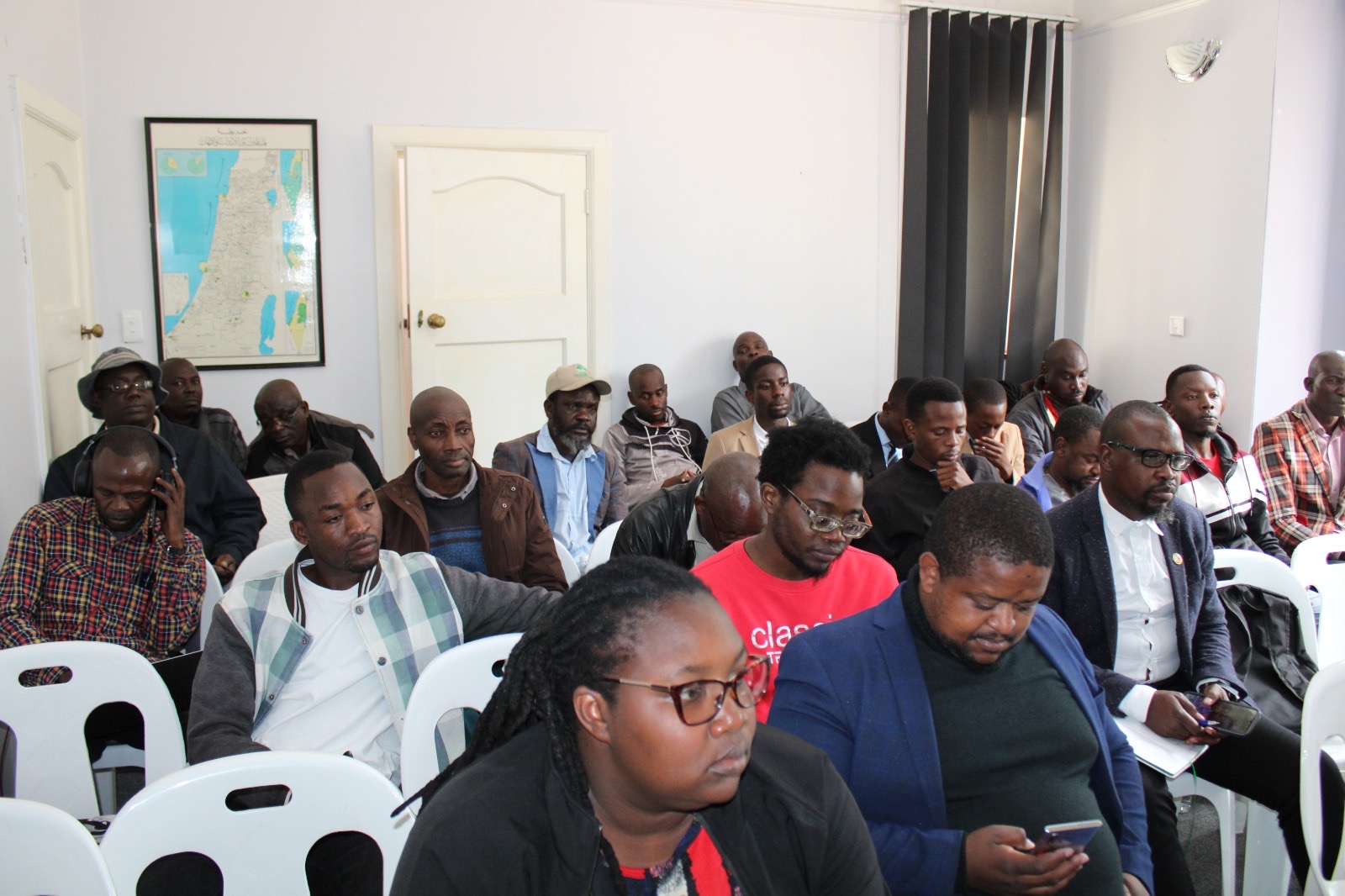By Edward Makuzva
In a bold move to amplify informed journalism and reshape narratives on one of the world’s longest-running conflicts, a group of Southern African journalists recently participated in a specialized training workshop focused on Israeli colonialism and the Palestinian struggle.
Held against the backdrop of increasing global calls for justice and decolonization, the training aimed to capacitate media professionals with critical historical, political, and socio-cultural insights that are often underreported or misrepresented in mainstream discourse.
Organized by the Zimbabwe Palestine Newsroom Connect and the Palestine Media Forum , the workshop provided an in-depth exploration of the origins and ongoing realities of the Israeli occupation of Palestine, drawing parallels with Southern Africa’s own colonial and apartheid past.
The two day workshop”titled “An Introductory Course to the Palestinian Issue for Journalists in Southern Africa,” which the event brought together journalists from across the region, including participants from Zimbabwe, Namibia, Botswana, South Africa, and Zambia.
From dissecting international law violations and settlement expansion to understanding the humanitarian crises in Gaza and the West Bank, the program encouraged nuanced storytelling rooted in truth, human rights, and ethical reporting.
The initiative comes at a crucial time, as misinformation, censorship, and biased reporting continue to shape public opinion on the Israel-Palestine conflict. By empowering journalists with credible knowledge and firsthand accounts from Palestinians and experts in international law, the training fosters responsible journalism that can challenge dominant narratives and support justice-based reporting across Africa and beyond.
Speaking during a virtual conference hosted by the Palestine Media Forum in Turkey, Dr. Habib Omar, a Research Fellow at the Asia Middle East Centre for Research and Dialogue in Malaysia, emphasized that the role of the media in shaping public perception about the Israeli occupation is more crucial than ever, especially in the face of growing disinformation and media bias.
He emphasized journalists to move beyond surface-level reporting and instead interrogate the deeper historical and structural causes of the conflict—pointing specifically to the enduring legacies of colonialism, apartheid, and systemic oppression.
“Journalists must move beyond surface-level reporting and instead interrogate the deeper historical and structural causes of the conflict—particularly the enduring legacies of colonialism, apartheid, and systemic oppression,” Dr Omar explained.
Dr. Omar described the situation in Gaza as dire and catastrophic, emphasizing the devastating humanitarian toll of ongoing Israeli military operations.
He highlighted that widespread civilian suffering, the collapse of essential services, and the destruction of critical infrastructure, including hospitals, schools, and water facilities.
Dr Omar underscored that the blockade and repeated bombardments have turned Gaza into what he called an “open-air prison,” where over two million people, mostly women and children, are trapped without access to basic necessities, medical care, or safe shelter.
He called on journalists not only to report the facts on the ground but to contextualize them within the broader historical and political framework including the legacy of colonialism, systemic displacement, and decades of occupation so that global audiences can better understand the root causes of the conflict.
Tarisai Mudahondo, a female journalist who attended the two-day workshop, added that the training not only deepened her understanding of Israeli colonial practices, but also strengthened her capacity to report on the Palestinian struggle with greater historical, political, and human rights context.
“The workshop opened my eyes to the structural injustices Palestinians face daily—from displacement to military occupation.
“As a journalist and as a woman, I was especially moved by the tragic reality that women and children are being disproportionately affected by this conflict. I now feel more equipped to tell these stories with sensitivity, accuracy, and a deeper sense of justice. I stand in solidarity with the people of Palestine”, said Mudahondo.
In his Close Remarks, the Chargé d’Affaires at the Embassy of Palestine in Zimbabwe,
Salim Siam, emphasized the importance of solidarity from the international community, particularly from African nations who share a history of colonial oppression.
He urged journalists to play an active role in amplifying Palestinian voices and exposing the daily realities of life under occupation, including home demolitions, illegal settlements, and the targeting of civilians.
“The people of Palestine will never surrender,” he declared. “We will continue to fight for our freedom by all means necessary. This is not just a political struggle—it is a fight for dignity, justice, and the right to exist in our own land.”
“The people of Palestine will never surrender.Our struggle will persist by all means necessary—not merely as a political cause, but as a fight for dignity, justice, and our fundamental right to exist and live freely in our own land”, Siam added.

